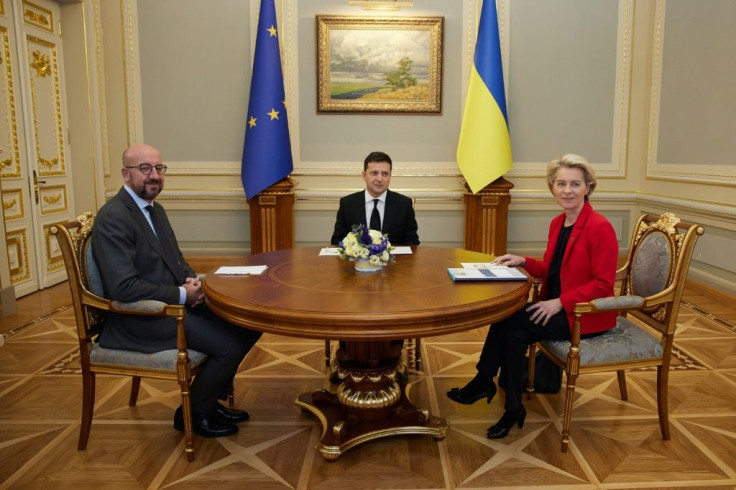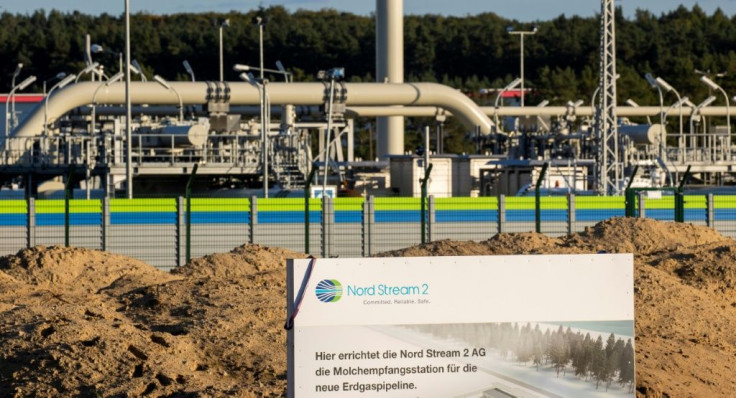Ukraine Demands Greater Support From Lukewarm EU
Ukrainian President Volodymyr Zelensky on Tuesday demanded more support from European leaders against Russia but came away from talks with few practical measures.
Zelensky hosted European Council leader Charles Michel and European Commission leader Ursula von der Leyen in Kiev as Europe faces a gas crisis after a surge in prices and drop in reserves.
The Ukrainian leader, who fiercely opposes a new gas pipeline that is set to bypass his country and increase Europe's energy reliance on Russia, put the crisis front and centre on Tuesday.
"It is necessary to develop a common long-term vision of Europe's energy security," Zelensky told a news conference after the talks.
Ukraine -- in conflict with Russia since Moscow's 2014 annexation of Crimea -- wants to ensure it will remain a key transit country even after gas begins flowing through Nord Stream 2, a Baltic Sea pipeline set to double natural gas supplies from Russia to Germany.
The pipeline, which is still awaiting approval from a German regulator, diverts supplies from an existing route through Ukraine and is expected to deprive Europe's ally of an estimated one billion euros ($1.1 billion) annually in transit fees from Russia.

Von der Leyen on Tuesday sought to reassure Zelensky. "Ukraine remains and must remain a reliable transit country," she said.
Critics have accused Moscow of intentionally limiting gas supplies to Europe and driving up prices in an effort to hasten Nord Stream 2's launch, a claim Russia has denied.
Given the unfolding crisis, Michel told Zelensky: "It is very important and urgent to intensify our cooperation."
"We can all see what are the geopolitical consequences, what are the geopolitical games, also, that are possible," he said.

Russian President Vladimir Putin stressed last week that his priority was not to put Ukraine "in a difficult position", but to be an "absolutely reliable partner" of Europe in the energy market.
At the same time, the Kremlin chief said that Ukrainian gas pipelines had not been repaired "for decades" and ramping up supplies via the post-Soviet country could lead to "negative consequences."
"Something can burst there at any moment," Putin said.
Moscow has not booked additional gas transit capacity via Ukraine to Europe for October, raising concerns.
Russia denies any pressure, saying it needs to fill its own reserves for the winter before sending supplies on to Europe.
Ukraine accuses Europe of timidity when it comes to Russia, whether on gas, military cooperation or Ukraine's prospects for integration into NATO and the European Union.
It has long been frustrated in its efforts to join the EU, with the 27-nation bloc saying Ukraine must first improve reforms.
On Tuesday, Michel and von der Leyen commended Zelensky on progress in those areas, but said that Kiev must keep focusing on reforming its judiciary system, the constitutional court and curbing the influence of oligarchs.
"It is already clear that we are following the same path, but where is the finish line on this path? And is there one?" Zelensky said.
The talks also focused on Ukraine's long-running war with pro-Russian separatists in the country's east in a conflict that has claimed more than 13,000 lives.
Ahead of the summit, the EU on Monday imposed sanctions on eight officials accused of targeting opponents of Russia's seizure of Crimea.
In a joint statement released after the talks, the three leaders reiterated their "strong condemnation" of "acts of aggression by the Russian armed forces since February 2014."
They also signed agreements improving aviation connections between Ukraine and the EU and joining Kiev to European nuclear research and innovation and cultural programmes.
© Copyright AFP 2024. All rights reserved.





















